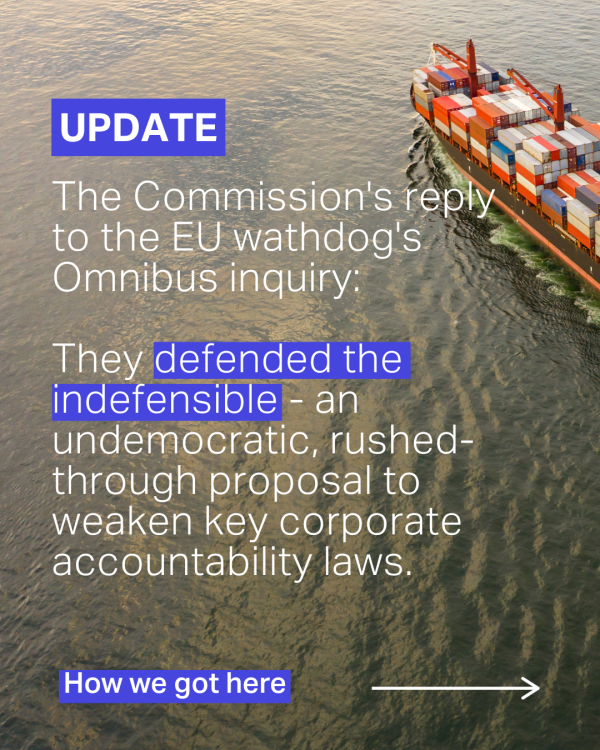This website uses cookies so that we can provide you with the best user experience possible. Cookie information is stored in your browser and performs functions such as recognising you when you return to our website and helping our team to understand which sections of the website you find most interesting and useful.

NGOs condemn the EU Commission’s obstinate refusal to acknowledge the undemocratic and opaque process that led to the so-called first Simplification Omnibus – and urge Members of the European Parliament (MEPs) to reject the weakening of key corporate accountability laws.
In a written response to the European Ombudswoman – which opened an inquiry into the potential maladministration by the Commission in the first Omnibus package – the Commission doubled down in defending the way its proposal was put forward, despite clear breaches of its own Better Regulation guidelines and essential procedural requirement under the European Climate Law.
In April, ClientEarth together with Anti-Slavery International, Clean Clothes Campaign, European Coalition for Corporate Justice, Friends of the Earth Europe, Global Witness, Notre Affaire À Tous and T&E, lodged a complaint with the Ombudswoman highlighting the flawed process that led to the Omnibus proposal, including the lack of public consultation, lack of transparency, absence of impact and climate assessments, and the disproportionate influence of corporate interests.

NGOs are calling on Members of the European Parliament to reject changes that would jeopardise the EU’s environmental goals and put companies committed to sustainability at a competitive disadvantage in an upcoming JURI Committee vote planned for October 13 and later in plenary session.
They are urging MEPs to take in account the lack of proper impact assessments and open consultation into their amendments proposals and their deliberations and prevent the unravelling of crucial safeguards against corporate human rights and environment abuses such as the Corporate Sustainability Due Diligence Directive (CSDDD).
The coalition of NGOs will submit their reply to the Ombudswoman on October 13.
ENDS
Notes to editors
On the EU Ombudsman complaint :
- On 18 April 2025, NGOs submitted a formal complaint to the European Ombudswoman, citing failures in the Commission’s preparation of the Omnibus proposal, specifically, the lack of a comprehensive impact assessment and inadequate public consultation.
- In response, the EU watchdog launched an inquiry into this case.
- On September 12, the EU Commission responded to the EU Ombudswoman’s inquiry.
On the legality of the EU Commission first Omnibus proposal:
- A first legal analysis has been published by Swedish law firm Cirio; setting out potential legal grounds to challenge the Omnibus , should Member States proceed without addressing these critical concerns.
- A preliminary legal analysis by Baldon Avocats, commissioned by ClientEarth and released on June 2025, warns that the Commission’s proposed regulatory rollbacks may violate several EU Treaty provisions. These include the Charter of Fundamental Rights and key principles of EU law, potentially opening the door to legal challenges.












